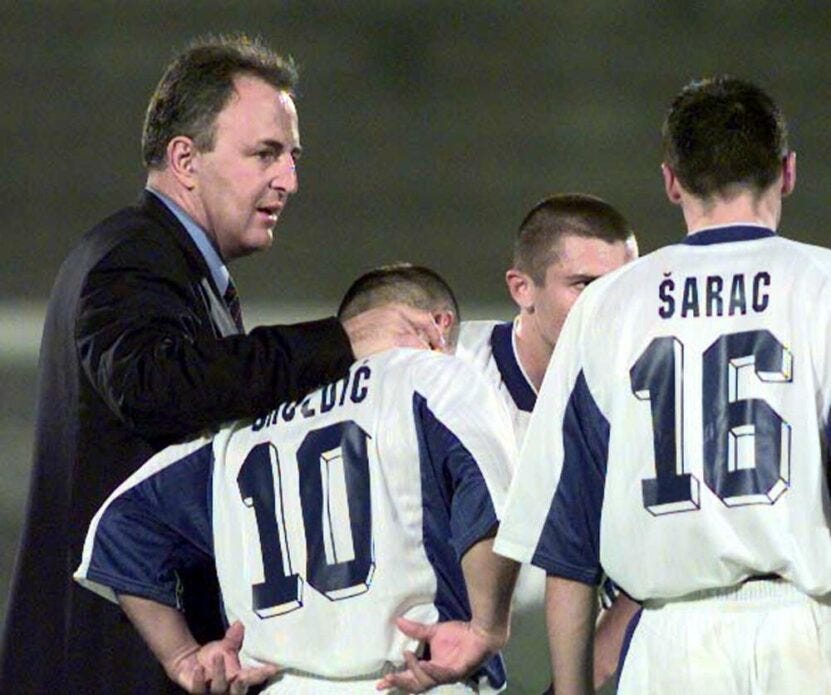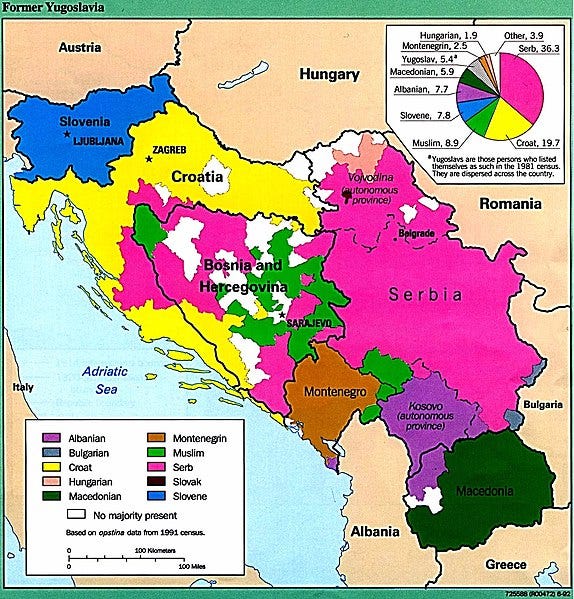The War Criminal who almost brought his team to the Champions League
FK Obilić: Arkan's biggest sport crime
On August 12, 1998, at Munich’s Olympiastadion, a seemingly routine first leg of the second preliminary round of the Champions League took place. The home team was Bayern Munich, hosting the relatively unknown Serbian side FK Obilić. Two major clubs have traditionally dominated Serbian football: Partizan Belgrade and Red Star Belgrade. That neither of these giants was competing for a spot in the Champions League was surprising enough. But the story behind FK Obilić made headlines that overshadowed anything happening on the pitch.
The Serbian club had secured their first and only national title the previous season, earning them a shot at European glory. They had already triumphed over Iceland’s IBV in the first preliminary round. However, against the Bavarian giants, FK Obilić was outmatched, suffering a heavy 4-0 defeat. Yet, the lopsided scoreline didn’t capture the world’s attention that night. Instead, all eyes were on the stands. The club’s president at the time was Svetlana Ražnatović, better known as Ceca, Serbia’s undisputed queen of turbo-folk music and the most famous singer in the country.
But why would Serbia’s biggest pop star own a football club? The answer lay in her husband, Zeljko Ražnatović, the club’s true owner, who was better known by his infamous alias: Arkan. The UN indicted him for crimes against humanity, and FK Obilić could only participate in European competition if he stepped down from the presidency.
Arkan
Becoming the president of FK Obilić was just the latest chapter in Arkan’s extraordinary and terrifying life. Born in 1952 in Brežice, in what is now Slovenia, he was the son of a Yugoslav army colonel. However, young Zeljko was never one for military discipline or rules. Instead, he was drawn to the underworld of crime. At 14, he started his career as a pickpocket on the streets of Belgrade, and by 17, he had found himself in a juvenile detention centre. Two years later, he was imprisoned for robbery, setting the tone for the first phase of his life—a career criminal, specializing in theft.
Arkan left Belgrade and embarked on a criminal spree across Europe, robbing in cities like Rome, Paris, and Amsterdam. His skill wasn’t just in stealing, but also in escaping—he managed to break out of Belgian and German prisons. Fluent in four languages and adept at creating false identities, he even took his notorious alias from a fake name on a Turkish passport.
These abilities brought him to the attention of the UDBA, Yugoslavia’s secret service. In the 1980s, Arkan was tasked with assassinating political dissidents who had fled the country. This was a time of growing tension in Yugoslavia. Tito, the father of the nation, had died, and the unity he had enforced was beginning to unravel. Tito had managed the near-impossible feat of keeping together six republics—Slovenia, Croatia, Serbia, Bosnia, Montenegro, and Macedonia—along with two autonomous regions, Kosovo and Vojvodina.
Arkan returned to Belgrade in 1989 and opened an ice cream shop across from Red Star Belgrade’s stadium, the Marakana. In short order, he became the leader of the Delije, the united fan group of Red Star. This wasn’t just a fan club; the decision to appoint him was backed by Belgrade’s political leaders, who needed someone capable of controlling the increasingly volatile organized fanbase.
Under Arkan’s leadership, Serbian nationalist fervour exploded in the stands of Red Star. He was present at Zagreb’s Maksimir Stadium during the infamous riots in 1990 between Red Star and Dinamo Zagreb fans—clashes often mistakenly cited as the spark of the war. These violent confrontations were more a reflection of the deepening crisis in Yugoslavia, where nationalist sentiments were boiling over across the republics. One moment that stands out is Zvonimir Boban’s flying kick against a police officer, a scene etched in football history.
The Collapse of Yugoslavia
“Six states, five nations, four languages, three religions, two alphabets, and one Tito.”
This rhyme captured the intricate complexity of Yugoslavia. Within its borders were people of different languages, religions, and ethnic identities. The term "Yugoslavia" referred to the South Slavs, but not everyone in the country felt part of this identity, especially the Albanians, who were concentrated in Kosovo, Montenegro, and Macedonia. In Kosovo, they made up 90% of the population, making it the most challenging issue for the Yugoslav government.
In 1987, Ivan Stambolić was president of Serbia, and one of his close associates was Slobodan Milošević. That year, Milošević was sent to Kosovo to ease tensions between the Albanian and Serbian communities and prevent an ethnic conflict. During his initial speech, he emphasized the importance of nationalism-free unity in Yugoslavia, promoting the motto “brotherhood and unity.”
However, things took a dramatic turn when Serbian nationalists requested a meeting. Against Tito’s long-standing policy of silencing nationalist movements, Milošević agreed. What followed was a carefully orchestrated protest by the Serbs, who falsely claimed that the Albanians were making their lives unbearable. This led Milošević to utter a statement that would remain in history: “You will not be beaten again”.
That evening, Serbian television immortalized Milošević as a hero defending the Serbian cause in Kosovo. What wasn’t shown was that the entire incident was staged. Milošević’s rise to power was built on a lie, with catastrophic consequences.
The early 1990s saw the violent disintegration of Yugoslavia. Slovenia and Croatia declared independence first, followed by Bosnia & Herzegovina, igniting three wars: a brief ten-day conflict in Slovenia, a longer war in Croatia, and worst of all, the Bosnian War. Sarajevo would endure a 1,425-day siege, and atrocities like the Srebrenica massacre, where over 8,000 Bosnian Muslims were killed by Serbian forces under Ratko Mladic, became indelible scars in history. The war in Bosnia ended with the 1995 Dayton Agreement, but violence flared again in Kosovo just a few years later, halted only by NATO’s intervention.
During this decade of bloodshed, Arkan carved out a notorious role for himself. He recruited the best fighters from Red Star’s fanbase to form a paramilitary group known as the Serbian Volunteer Guard, or Arkan’s Tigers. This group became infamous for its brutal crimes and violence in Vukovar, Bosnia, and Kosovo, earning a reputation as the most feared paramilitary force.
From War to Football
After the Bosnian War and before the Kosovo conflict, Arkan turned his attention to business, amassing wealth through nightclubs, construction companies, casinos, transportation, and bakeries. Eventually, he set his sights on football. His first attempt was to buy Red Star, but the club’s president, Dragan Dzajić, refused. Next, Arkan acquired Prishtina, purging the team of its Albanian players. The project failed to deliver results, and it quickly fell apart.
His third attempt was more successful. He acquired a lesser-known Belgrade team, FK Obilić. The club’s name is rooted in Serbian legend—Miloš Obilić, a medieval knight and a Serbian national hero who fought in the Battle of Kosovo in 1389. Though the Serbs lost that battle to the Ottomans, Obilić’s story, especially his alleged killing of Sultan Murad I, became a foundational myth for the Serbian nation.
Before Arkan’s acquisition, FK Obilić was a minor player in Serbian football, with little to show for its efforts. Their most significant achievement had been reaching the national cup final in 1995, only to lose to Red Star. Arkan’s arrival changed everything. He imposed military-style discipline on the team, banning alcohol before matches and punishing players who performed poorly. It’s said that after an away defeat, he forced the team to walk 30 kilometres back to Belgrade.
Arkan’s reign of terror extended to opponents and referees alike. He physically assaulted referees if he didn’t like their calls and used every dirty trick imaginable against rival teams—from spraying sedative gas in locker rooms to outright beatings. These brutal and unsporting tactics helped FK Obilić secure promotion to the Prva Liga, finishing 15 points clear of second place.
Once he slapped me and put a gun to my head as he was mad about the result. Although I was scared, there was no way I’d pull back. And guys from the Football Association begged me not to talk about this. In exchange, I was promised I wouldn’t have to referee Obilić’s games anymore.
Zoran Arsić, Referee
Road to Champions League
Arkan didn’t change his methods in the top division. He continued to use intimidation and violence to ensure FK Obilić’s success. The team won the championship by two points over Red Star, losing only one match all season. Arkan’s ultimate dream was to see his team in the Champions League, and it almost came true. But there was one obstacle: UEFA regulations barred anyone with a criminal record from holding a position in football. So Arkan handed over the presidency to his wife, Ceca. But everyone knew who was really in charge.
In the return match played in Belgrade, the game ended 1-1. Obilić’s Champions League dream ended there. After their exit from the Champions League, they faced another European giant, Atlético Madrid, in a UEFA Cup qualifier. The defeat against the Colchoneros marked the end of the club’s European journey for that season. Then came NATO's intervention in the Kosovo war, and Arkan was indicted for genocide and crimes against humanity by the International Court of The Hague.
On January 15, 2000, Arkan was killed while at the Intercontinental Hotel in Belgrade, shot dead by an assassin. It is said that the mastermind behind the murder was none other than Milosevic himself. Arkan knew too much about the crimes committed by Serbian troops in Croatia, Bosnia, and Kosovo. It’s believed that Milošević feared Arkan might talk once he was arrested.
Sources:
https://www.eastjournal.net/archives/116083
https://beyondthelastman.com/2016/07/20/heroes-villains-the-rise-fall-of-fk-obilic-belgrade/
https://www.planetfootball.com/in-depth/story-warlord-popstar-wife-led-fk-obilic-europe





